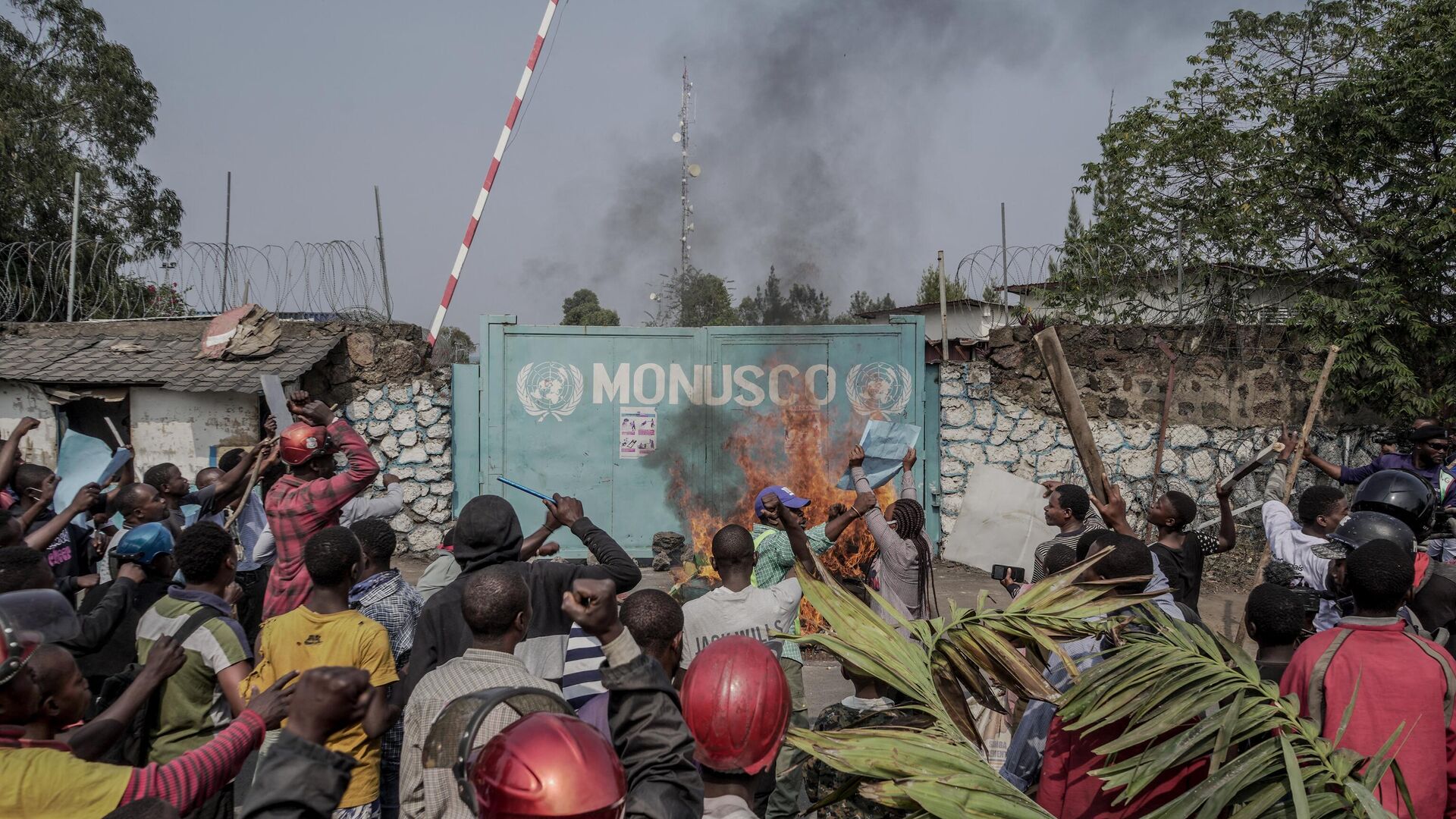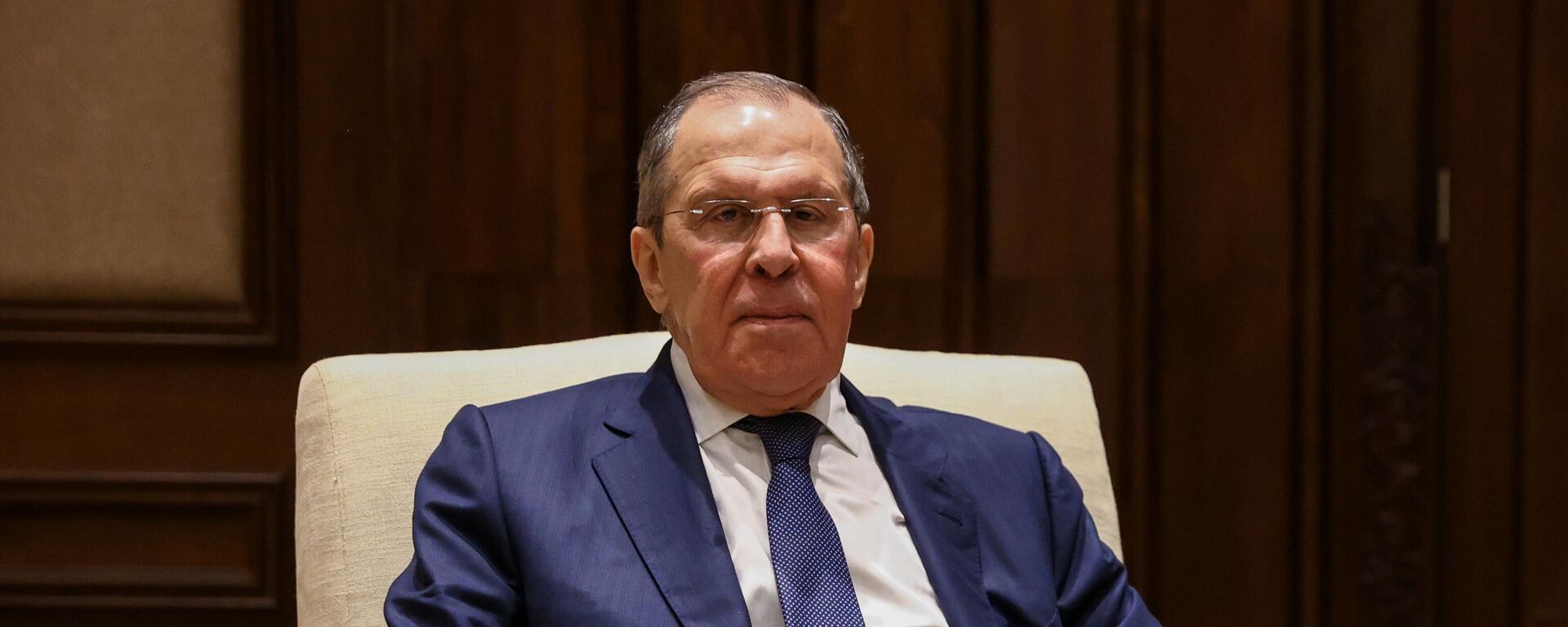Video: Protesters Loot UN Base in DR Congo’s Conflict-Torn North Kivu Amid Rwanda Standoff
20:20 GMT 25.07.2022 (Updated: 11:10 GMT 24.11.2022)
Subscribe
A large protest in the eastern Congolese city of Goma on Monday managed to break through the gates of the United Nations facility there, and protesters ransacked the compound before being driven off.
Hundreds of people descended on the headquarters of the United Nations Organization Stabilization Mission in the Democratic Republic of the Congo (MONUSCO) in Goma, a city on the border with Rwanda and the capital of the Democratic Republic of the Congo’s North Kivu Province.
Outside the compound, they blocked roads, chanted anti-UN slogans, set a UN car on fire, and skirmished with security forces, who responded with tear gas, according to footage of the demonstration.
#DRC #Goma Hundreds of demonstrators took to the streets town this Monday, July 25, 2022 to demand the departure of @MONUSCO in #DRC, in response to the call of the President of the Senate @PLukwebo and the ruling party #UDPS. Looting scenes were recorded at UN bases. pic.twitter.com/cd8kBOIWnb
— Baraka MUNYAMPFURA Héritier (@HeritierBarak) July 25, 2022
#DRC: The #MONUSCO photo of the day | July 25, 2022 | #Goma pic.twitter.com/GXqvBOwObD
— Gen Sultan MAKENGA (@SultaniMAKENGA) July 25, 2022
MONUSCO needs M23 protection in Goma pic.twitter.com/poChDcD2lh
— Nicole Keza (@RwandaGihanga) July 25, 2022
After the protestors broke into the offices, they carried off loot including computers and furniture, according to AFP. Congolese troops reportedly joined them in the looting, with what seems to be at least one soldier being spotted in footage posted online, driving off with solar panels.
#DRC: A video of a congolese soldier looting @MONUSCO properties during Protest against MONUSCO in #Goma #DRCKillingItself @PatrickMuyaya @HeritierRW @radiookapi @politicocd @KalindaMwene @IngabireIm @luchaRDC @jm_senga @senatrdc pic.twitter.com/YJbuAos1X4
— John mugisha (@Johnmugisha1) July 25, 2022
“We strongly condemn any form of attack against United Nations personnel and facilities. Those responsible will be prosecuted and severely punished,” Patrick Muyaya, a spokesperson for DRC President Felix Tshisekede, said on social media after the attack.
“The process of withdrawing MONUSCO has already been initiated,” he added. “Pending its completion, the Government will respect each of its commitments contained in the agreement which binds us, in particular with regard to the security of its personnel and its installations.”
MONUSCO’s presence is highly unpopular, even among Tshisekede’s Union for Democracy and Social Progress (UDPS). Prior to Monday’s protests, the party’s youth wing in Goma demanded the UN’s “withdrawal from Congolese soil without conditions because it has already proved its incapacity to provide us with protection,” according to Rwanda’s New Times.
In addition, Modeste Bahati, the president of the Congolese Senate, said earlier this month that MONUSCO should “pack its bags.”
More than 120 armed groups roam the region, and MONUSCO has attracted no shortage of criticism for its failure to stop their fighting or abuses committed against the local population. The peacekeeping force has 14,000 international troops and a $1.4 billion budget, and has been in Kivu since 1999, although it only acquired a mandate for offensive operations in 2013, amid the first M23 uprising.
When the M23 took up arms once more in late 2021, it helped set in motion the present crisis, in which the DRC government has accused Rwanda of backing and controlling the majority-Tutsi militia. Both Kigali and the M23 have denied the accusations, with the M23 rejecting a recent “ceasefire” deal between Kigali and Kinshasa, saying “we are Congolese, not Rwandans.”
Rwanda, in turn, accuses DRC of backing the Democratic Forces for the Liberation of Rwanda (FDLR), a Hutu Power militia in North Kivu formed by those who perpetrated the 1994 genocide of Tutsis and Twa in Rwanda, which the M23 has fought since reforming last year; Kinshasa denies this accusation, although like the alleged Rwanda-M23 connection, there is some evidence to support Rwanda’s claim.
Tshisekedi’s approach to the crisis, which has also included threatening Rwanda with war and severing normal diplomatic and trade relations with its eastern neighbor, has also faced domestic criticism. Last week, Nobel laureate Denis Mukwege, a doctor who has long worked in the region to treat victims of sexual assault and abuses during war, accused the president of “worsening instability in the region” and warning it would inevitably lead to new abuses against women.
"Each peak of instability corresponds to a peak in the number of women and girls who are victims of sexual violence that we take care of,” he said. “We have only one certainty: women and children will be affected again, and will be the first victims of this new cycle of violence.”
The intermittent fighting since November has displaced some 70,000 people near the city of Goma on Lake Kivu. Across the country, some 5.6 million people are internally displaced - the most of any African country.




